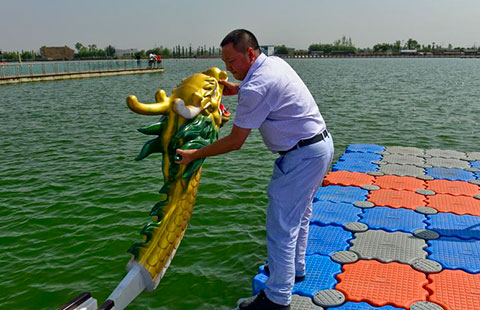Deals grow along Belt and Road
By Du Juan and Lu Hongyan (China Daily) Updated: 2015-06-23 08:46Chinese companies are seeing concrete opportunities arise, both in domestic provinces and overseas countries, along the routes of the Belt and Road Initiative.
According to the latest data from the Ministry of Commerce, the nation's foreign direct investment in countries along the Silk Road Economic Belt and the 21st Century Maritime Silk Road reached $2.56 billion during the first quarter of the year, accounting for about 10 percent of the country's total FDI during the period.
Shen Danyang, a spokesman for the ministry, said China exported $144.5 billion to countries along the routes during the period, a 10 percent rise year-on-year.
The statistics also show China now has more than 70 projects under construction in countries along the routes, worth total investment of more than $8 billion yuan ($1.3 billion), according to Shen.
One of the highest profile events so far to pave the way for Chinese companies to expand along the routes was held last month in Xi'an, capital city of Shaanxi province.
The Silk-Road International Commercial Chambers Conference attracted representatives of businesses and governments from Nepal, Sri Lanka, Kyrgyzstan, Russia, Turkey and Pakistan, and all expressed great enthusiasm for opportunities to partner with Chinese companies, said officials.
Muhammed Akram Farid, vice-chairman of the Pakistan Joint Chamber of Commerce and Industry, said during the roundtable-style event that the country expects huge benefits to come from international trade along the routes.
"China agreed to a host of projects with Pakistan after President Xi Jinping's visit in April, which has helped to built an important connection between the two nations," he said.
Rima Apasova, vice-chairman of Kyrgyzstan Chamber of Commerce and Industry, also said that the initiative would bring that country "growing communication and closer connections with other countries, which is good for the nation.
"We are working on policies to attract Chinese companies to do businesses in the energy sector, particularly, such as exploration and processing," said Apasova.
A major oil joint-venture project between China and Kyrgyzstan is under development and some companies in Shaanxi province have registered strong interests in investing further in the country's energy sector, said Apasova.
Further east into Europe, Belarus is another country that has expressed strong willingness to become one of the platforms for the implementation of the initiative.
Xi visited the country in May and during the trip Jinchuan Group Co Ltd, China's largest refined nickel producer, signed a memorandum of understanding with Belarusian officials.
"The company is seeking further business opportunities in overseas resources markets along the silk roads," said Tang Chaoju, a representative of Jinchuan, adding the company plans to build a mineral processing factory in Belarus.
Private investors, meanwhile, are also seeing a rise in activities as a result of the initiative.
Xue Chaohua in Lanzhou contributed to this story.
- Sony's TV making being driven by Chinese demand
- Cautious approach can eliminate currency risks
- Manufacturer in global push
- Uber breathes fresh air into branding
- Goldman strategist says stock prices 'are too high'
- China to promote cross-border e-commerce as incomes rise
- Two e-commerce giants shop for growth in Russia
- Securities regulatory official removed

















